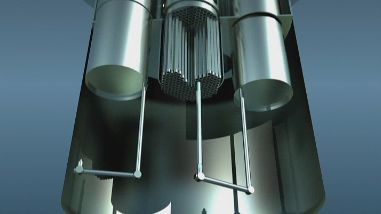Vrije Universiteit Brussel
In-Vessel Remote Handling in Heavy-Liquid-Metal-Cooled Reactors – a Safety ApproachIntroductionOne of the main concerns of nuclear energy is the treatment of the nuclear waste and thus technology of nuclear power plants that decreases waste output and waste half-life is consequently very interesting. This is one of the principal aims of the MYRRHA (Multi-purpose, hYbrid Research Reactor for High-tech Applications) reactor project, in preparation for the arrival of the Generation IV reactors (GEN IV). As a subcritical reactor driven externally by a high-powered accelerator, MYRRHA will be one of the earliest global demonstrations of a new class of safer nuclear devices called “Accelerator Driven Systems” (ADS). One of the major advantages of the ADS, besides its subcriticality, is its transmutation of minor actinide waste. Lead-Bismuth Eutectic (LBE) was chosen as the spallation target and coolant for its high spallation efficiency, having a good heat capacity and reduced impact on the speed of the neutrons. Two in-vessel fuel manipulators (IVFM) operating from under the core with 4 degrees of freedom (DOF) must move the fuel assemblies between the core, storage and ex-vessel fuel transfer machine positions. The IVFM is thus a critical component of the MYRRHA reactor – it is essential to demonstrate its safe operation in proving the feasibility of the complete reactor by 2014, otherwise the design of the complete reactor vessel needs to be rethought with many delays as consequence. The LBE environment presents many technological challenges to such a fuel handlers: temperatures of 200°C to 300°C, zero visibility, hydrodynamic forces, corrosion, fast neutron irradiation, and the fatigue of long operating periods.
Goal of the projectThis collaborative PhD between the SCK•CEN and the VUB deals with the development of the IVFM from a safety approach, with the objectives to define the acceptance criteria for safe fuel operation, the design and operation methods to reach these, and the tests to validate these methods. It is within the framework of the European Utility Requirements (EUR) and International Atomic Energy Agency (IAEA) guidelines that we must define the safety architecture for fuel manipulation and establish an analysis to prove the adequacy of the design and fault response measures in minimizing the related risks to a tolerable level.
Financial supportThis research is financed by a joint VUB-AVN grant.
Project groupThis project will be coordinated between the university, the nuclear research center and the nuclear safety institute Researcher:
Promoters:
Bram Vanderborght (VUB), bvdborgh@vub.ac.be Peter Baeten (SCK•CEN), pbaeten@sckcen.ac.be Jean Vereecken (AVN), jvereeck@vub.ac.be Interesting links |
©2019 • Vrije Universiteit Brussel • Dept. MECH • Pleinlaan 2 • 1050 Elsene
• Tel.: +32-2-629.28.06 • Fax: +32-2-629.28.65 • webmaster

